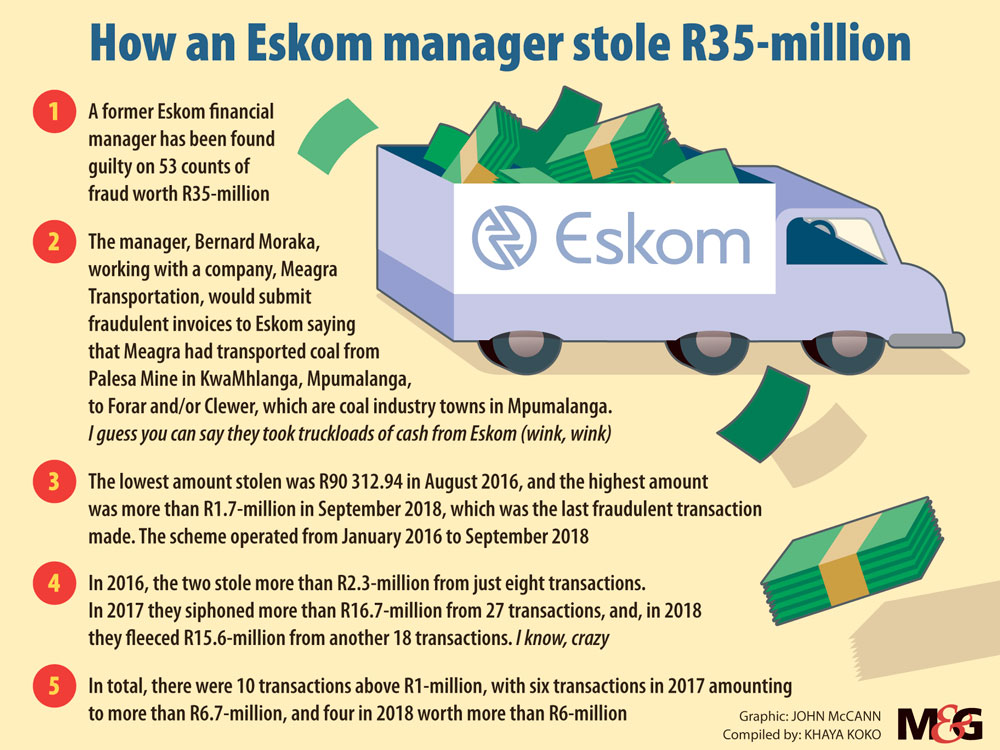Eskom told the Mail & Guardian it had only received a R9 billion World Bank loan to decommission its coal-fired Komati power station. (Waldo Swiegers/Bloomberg via Getty Images)
Eskom’s former finance manager has been found guilty of defrauding the company of R35-million, while the power utility continues to be hit by rolling blackouts.
Bernard Moraka will be sentenced for running a two-and-a-half-year scam with Victor Tshabalala, the sole director of Meagra Transportation, the company that scored 53 fraudulent payments for work not done.
In a statement issued in October 2019, Eskom said of the case: “This is indeed part of the Eskom clean-up campaign as this matter is one of the priority cases tracked by Eskom.” Eskom’s debt stands at R402-billion, according to the company’s chief executive, Andre de Ruyter.
Moraka and Tshabalala ran the scam from January 2016 to September 2018.
Tshabalala pleaded guilty to all counts, but Moraka professed his innocence, despite the state having evidence against him that included bank statements.
The two were arrested and released on bail of R20 000 in 2019 and convicted in September this year. They will be sentenced at the Johannesburg specialised commercial crimes court sitting in Palm Ridge on 9 November.
Moraka pleaded poverty during his bail application in October 2019, saying that he and his five children relied on his wife for financial support. He had a house in Johannesburg worth R2.5-million.
It emerged during the two-year court case that Moraka has a previous theft conviction. He was found guilty of shoplifting in 1997, a year after he matriculated.
“At the moment, I have no other income and I am relying on my wife [for financial support]. In 1997, I was convicted in Zeerust [in North West] of shoplifting and sentenced to correctional service,” Moraka said at the time in an affidavit read out in court.
How the fraud was orchestrated
In the charge sheet presented by prosecutor Bongani Chauke, the state detailed how Meagra Transportation had a contract with Eskom to ferry coal to designated areas in Mpumalanga.
“Meagra was used by both accused as a vehicle to defraud Eskom … The said close corporation [Meagra] was never inducted to render such a service at Palesa Mine. They [Moraka and Tshabalala] were therefore not entitled to claim any payments from Eskom for trips from Palesa Mine to Forfar and/or Clewer,” reads the charge sheet.
According to bank records submitted as part of the chain of evidence, the pair started off slowly and gradually increased the amounts in the fraudulent invoices submitted.

The lowest amount claimed was R90 312.94, which was the fourth fraudulent transaction and was made in August 2016. The highest and last invoice paid was the 53rd September 2018, when they received more than R1.7-million.
Eight transactions were claimed in 2016, and R2.3-million was stolen between January and December of that year.
More than R16.7-million was paid out in 2017 in 27 transactions, and more than R15.6-million in 2018 over 18 transactions.
In 2017 and 2018 Moraka and Tshabalala scored more than R1-million in 10 payments. In 2017, six payments exceeded R1-million and four were above the R1-million mark in 2018.
In total, Moraka and Tshabalala made off with R34 984 427.57.